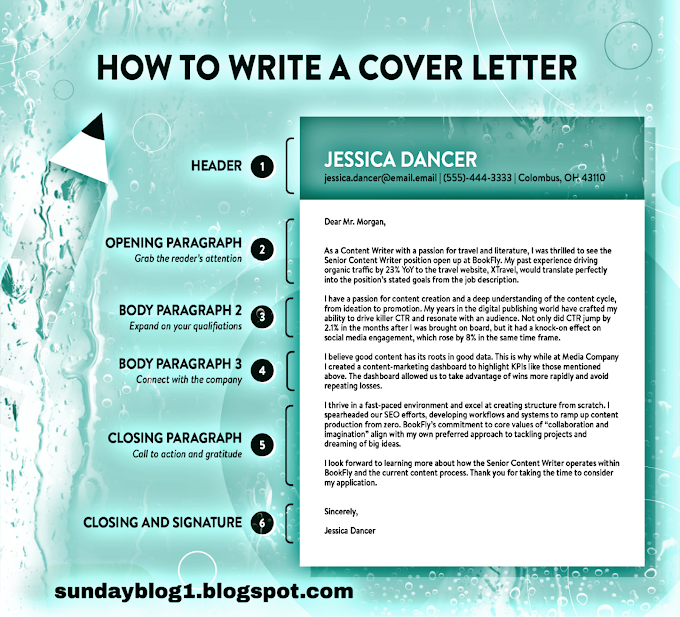Learn the essential tips and best practices for writing a compelling cover letter that will help you land your next job. Discover how to tailor your cover letter to the specific job and company, showcase your qualifications and experiences, and avoid common mistakes. Whether you're just starting out or have years of experience, our guide on "How to Write a Cover Letter" will help you stand out from the competition and increase your chances of getting an interview.
Introduction
When you're applying for a job, a well-written cover letter can make all the difference. A cover letter is an important document that accompanies your resume or CV when you apply for a job. It provides an opportunity for you to showcase your qualifications and explain why you're the perfect fit for the position. In this blog post, we'll go over the key elements of a great cover letter and provide tips for making sure yours stands out from the competition.
Importance of Tailoring Your Cover Letter:
One of the most important things to keep in mind when writing a cover letter is that it should be tailored to the specific job and company you're applying to. Tailoring your cover letter to the specific job and company is crucial for making a strong impression. It demonstrates to the employer that you have done your research and are genuinely interested in the position. It's worth taking the time to personalize your cover letter for each job you apply for, even if it means starting from scratch each time.
How to Start Your Cover Letter:
The first thing you want to do when starting your cover letter is to use a formal salutation and address the hiring manager by name, if possible. This shows that you've done your research and that you're taking the time to personalize your application. Use an engaging opening sentence that highlights your relevant qualifications and enthusiasm for the position. You want to grab the hiring manager's attention right from the start, so make sure your opening sentence is interesting and compelling.
What to Include in the Body of Your Cover Letter:
The body of your cover letter is where you'll want to use specific examples and accomplishments to demonstrate how your skills and experience make you a good fit for the position. This is where you'll want to explain how your qualifications align with the job requirements and the company's mission and values. Use concrete examples of your experience and accomplishments to show the hiring manager that you're the right person for the job.
How to End Your Cover Letter:
When ending your cover letter, you want to summarize your qualifications and reiterate your interest in the position. Include a call to action, such as asking for an interview or requesting further information. This shows the hiring manager that you're proactive and that you're eager to take the next step in the hiring process.
Cover Letter Tips and Best Practices:
Here are some tips to keep in mind when writing your cover letter:
- Keep it concise and to the point
- Use a professional tone and avoid overly casual language
- Use the same font and formatting as your resume
- Make sure to proofread and have someone else review it before submitting
Common Mistakes to Avoid in Your Cover Letter:
When writing your cover letter, it's important to avoid some common mistakes that can weaken your application:
- Using a generic or template cover letter
- Making spelling and grammar errors
- Failing to tailor your cover letter to the specific job and company
Conclusion and Next Steps:
A well-written cover letter can help you stand out from the competition and increase your chances of getting an interview. To write an effective cover letter, it's important to tailor it to the specific job and company, highlight your qualifications, and avoid common mistakes. Remember to proofread your cover letter and have someone else review it before submitting. With these tips and best practices in mind, you'll be well on your way to writing a great cover letter that will help you land your next job
FAQ...
Q: How long should a cover letter be?
A: A cover letter should be concise and to the point, typically no more than one page in length. It's important to keep it focused on the most relevant information and qualifications that make you a good fit for the position.
Q: Should I include my salary requirements in my cover letter?
A: It's generally not a good idea to include your salary requirements in your cover letter. This information can be discussed later in the interview process or during salary negotiations. Instead, focus on highlighting your qualifications and how they align with the job requirements.
Q: Is it okay to use a template for my cover letter?
A: While it can be helpful to use a template as a guide for formatting and structure, it's important to avoid using a generic or template cover letter. A template may not be tailored to the specific job or company, which is crucial for making a strong impression. Instead, use the template as a guide and personalize it to the specific job and company.
Q: How can I make my cover letter stand out?
A: To make your cover letter stand out, it's important to tailor it to the specific job and company, highlight your relevant qualifications, and use specific examples of your experience and accomplishments. Use an engaging opening sentence and a strong call to action. Additionally, proofreading and having someone else review it before submitting can also make sure it stands out
Q: Should I include references in my cover letter?
A: It's generally not necessary to include references in your cover letter. If the employer requests references, they will typically ask for them separately. Instead, focus on highlighting your qualifications and how they align with the job requirements in your cover letter.





